University IT Ethics Assignment: Case Study and Ethical Dilemmas
VerifiedAdded on 2023/04/26
|9
|2137
|310
Essay
AI Summary
This assignment analyzes ethical issues in Information Technology through a case study involving a developer, Rahul, whose work was plagiarized by his boss. It examines the ethical implications of this action from the perspective of the ACS Code of Professional Conduct, identifying relevant values such as professionalism, professional development, and honesty. The assignment then applies ethical theories, including utilitarianism, deontology, virtue theory, and social contract theory, to evaluate the ethical dimensions of the case. Furthermore, the essay extends to a discussion on the ethical dilemmas of decision-making processes in self-driving cars, comparing social and professional ethics, and highlighting issues of safety, security, and the impact on employment. The analysis emphasizes the need for advanced philosophical approaches to address ethical challenges in emerging technologies.
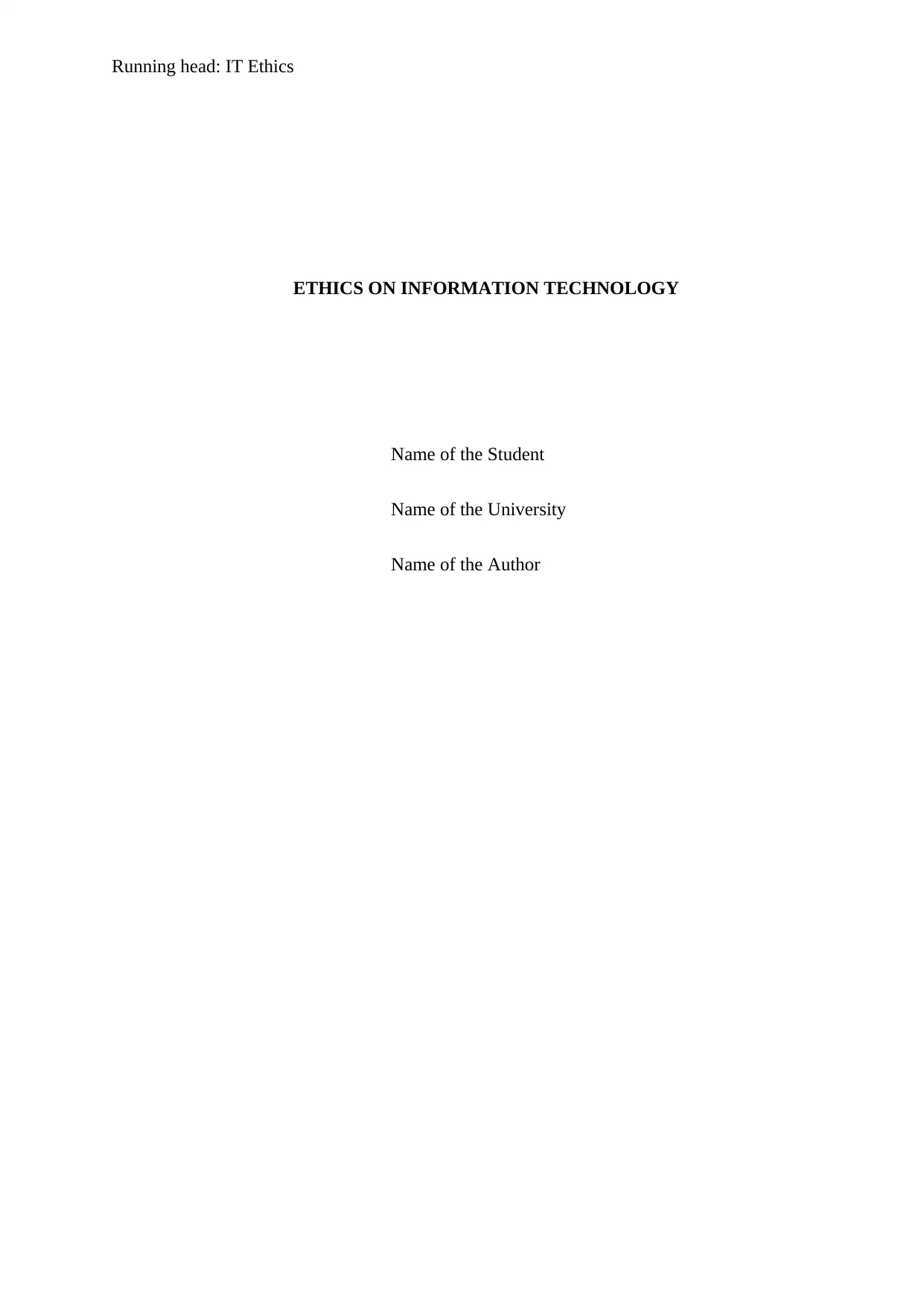
Running head: IT Ethics
ETHICS ON INFORMATION TECHNOLOGY
Name of the Student
Name of the University
Name of the Author
ETHICS ON INFORMATION TECHNOLOGY
Name of the Student
Name of the University
Name of the Author
Paraphrase This Document
Need a fresh take? Get an instant paraphrase of this document with our AI Paraphraser
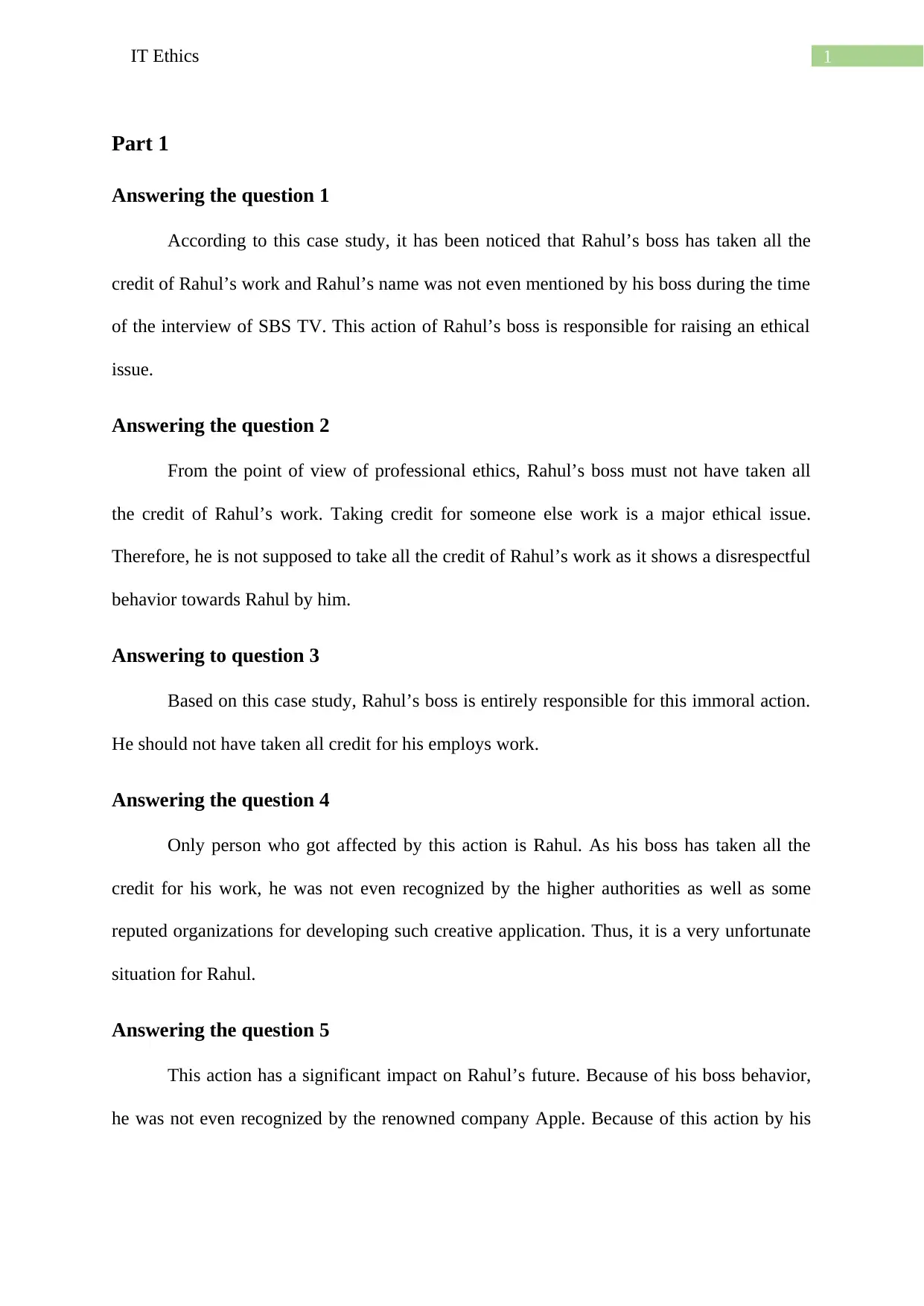
1IT Ethics
Part 1
Answering the question 1
According to this case study, it has been noticed that Rahul’s boss has taken all the
credit of Rahul’s work and Rahul’s name was not even mentioned by his boss during the time
of the interview of SBS TV. This action of Rahul’s boss is responsible for raising an ethical
issue.
Answering the question 2
From the point of view of professional ethics, Rahul’s boss must not have taken all
the credit of Rahul’s work. Taking credit for someone else work is a major ethical issue.
Therefore, he is not supposed to take all the credit of Rahul’s work as it shows a disrespectful
behavior towards Rahul by him.
Answering to question 3
Based on this case study, Rahul’s boss is entirely responsible for this immoral action.
He should not have taken all credit for his employs work.
Answering the question 4
Only person who got affected by this action is Rahul. As his boss has taken all the
credit for his work, he was not even recognized by the higher authorities as well as some
reputed organizations for developing such creative application. Thus, it is a very unfortunate
situation for Rahul.
Answering the question 5
This action has a significant impact on Rahul’s future. Because of his boss behavior,
he was not even recognized by the renowned company Apple. Because of this action by his
Part 1
Answering the question 1
According to this case study, it has been noticed that Rahul’s boss has taken all the
credit of Rahul’s work and Rahul’s name was not even mentioned by his boss during the time
of the interview of SBS TV. This action of Rahul’s boss is responsible for raising an ethical
issue.
Answering the question 2
From the point of view of professional ethics, Rahul’s boss must not have taken all
the credit of Rahul’s work. Taking credit for someone else work is a major ethical issue.
Therefore, he is not supposed to take all the credit of Rahul’s work as it shows a disrespectful
behavior towards Rahul by him.
Answering to question 3
Based on this case study, Rahul’s boss is entirely responsible for this immoral action.
He should not have taken all credit for his employs work.
Answering the question 4
Only person who got affected by this action is Rahul. As his boss has taken all the
credit for his work, he was not even recognized by the higher authorities as well as some
reputed organizations for developing such creative application. Thus, it is a very unfortunate
situation for Rahul.
Answering the question 5
This action has a significant impact on Rahul’s future. Because of his boss behavior,
he was not even recognized by the renowned company Apple. Because of this action by his
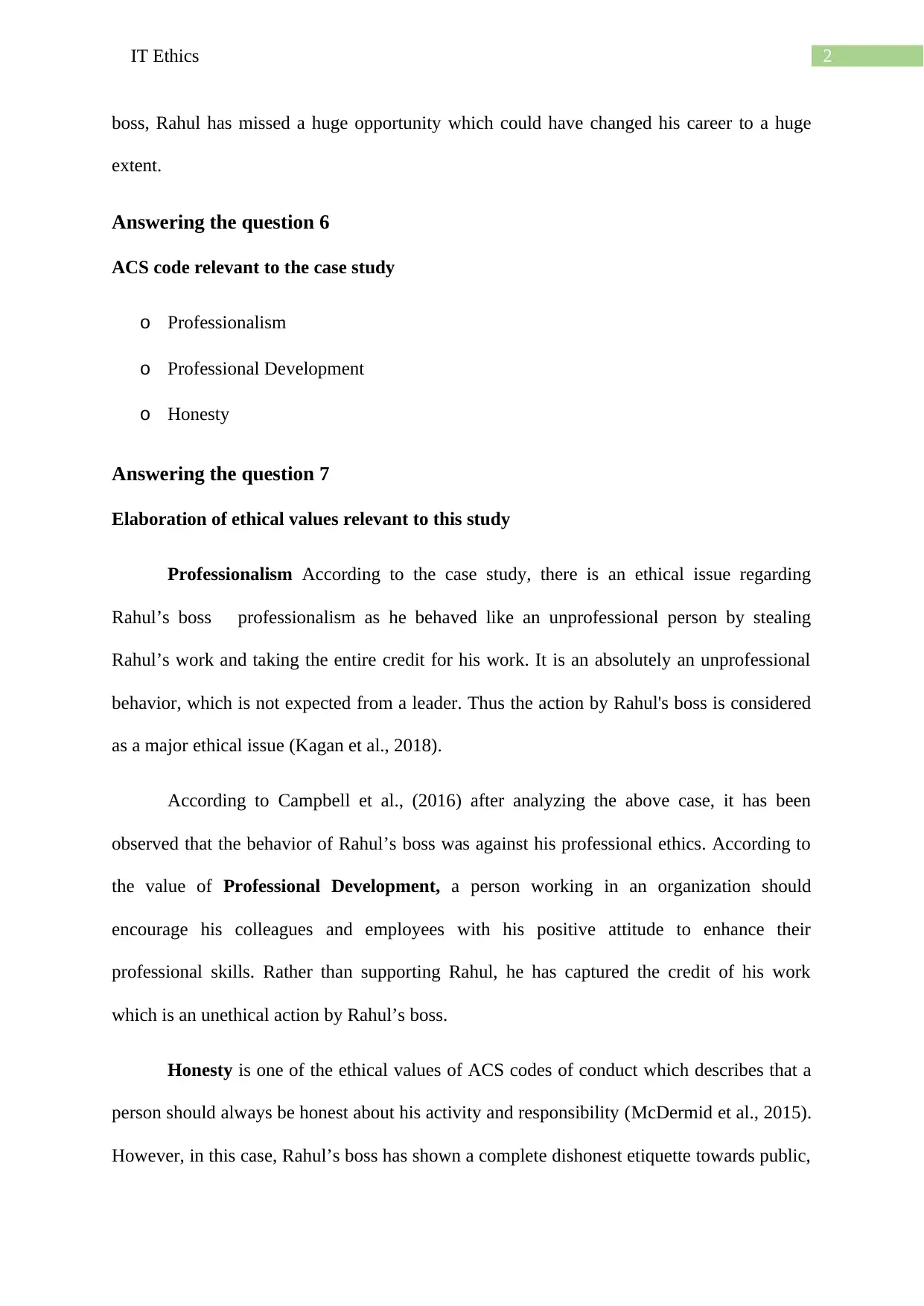
2IT Ethics
boss, Rahul has missed a huge opportunity which could have changed his career to a huge
extent.
Answering the question 6
ACS code relevant to the case study
o Professionalism
o Professional Development
o Honesty
Answering the question 7
Elaboration of ethical values relevant to this study
Professionalism According to the case study, there is an ethical issue regarding
Rahul’s boss professionalism as he behaved like an unprofessional person by stealing
Rahul’s work and taking the entire credit for his work. It is an absolutely an unprofessional
behavior, which is not expected from a leader. Thus the action by Rahul's boss is considered
as a major ethical issue (Kagan et al., 2018).
According to Campbell et al., (2016) after analyzing the above case, it has been
observed that the behavior of Rahul’s boss was against his professional ethics. According to
the value of Professional Development, a person working in an organization should
encourage his colleagues and employees with his positive attitude to enhance their
professional skills. Rather than supporting Rahul, he has captured the credit of his work
which is an unethical action by Rahul’s boss.
Honesty is one of the ethical values of ACS codes of conduct which describes that a
person should always be honest about his activity and responsibility (McDermid et al., 2015).
However, in this case, Rahul’s boss has shown a complete dishonest etiquette towards public,
boss, Rahul has missed a huge opportunity which could have changed his career to a huge
extent.
Answering the question 6
ACS code relevant to the case study
o Professionalism
o Professional Development
o Honesty
Answering the question 7
Elaboration of ethical values relevant to this study
Professionalism According to the case study, there is an ethical issue regarding
Rahul’s boss professionalism as he behaved like an unprofessional person by stealing
Rahul’s work and taking the entire credit for his work. It is an absolutely an unprofessional
behavior, which is not expected from a leader. Thus the action by Rahul's boss is considered
as a major ethical issue (Kagan et al., 2018).
According to Campbell et al., (2016) after analyzing the above case, it has been
observed that the behavior of Rahul’s boss was against his professional ethics. According to
the value of Professional Development, a person working in an organization should
encourage his colleagues and employees with his positive attitude to enhance their
professional skills. Rather than supporting Rahul, he has captured the credit of his work
which is an unethical action by Rahul’s boss.
Honesty is one of the ethical values of ACS codes of conduct which describes that a
person should always be honest about his activity and responsibility (McDermid et al., 2015).
However, in this case, Rahul’s boss has shown a complete dishonest etiquette towards public,
⊘ This is a preview!⊘
Do you want full access?
Subscribe today to unlock all pages.

Trusted by 1+ million students worldwide
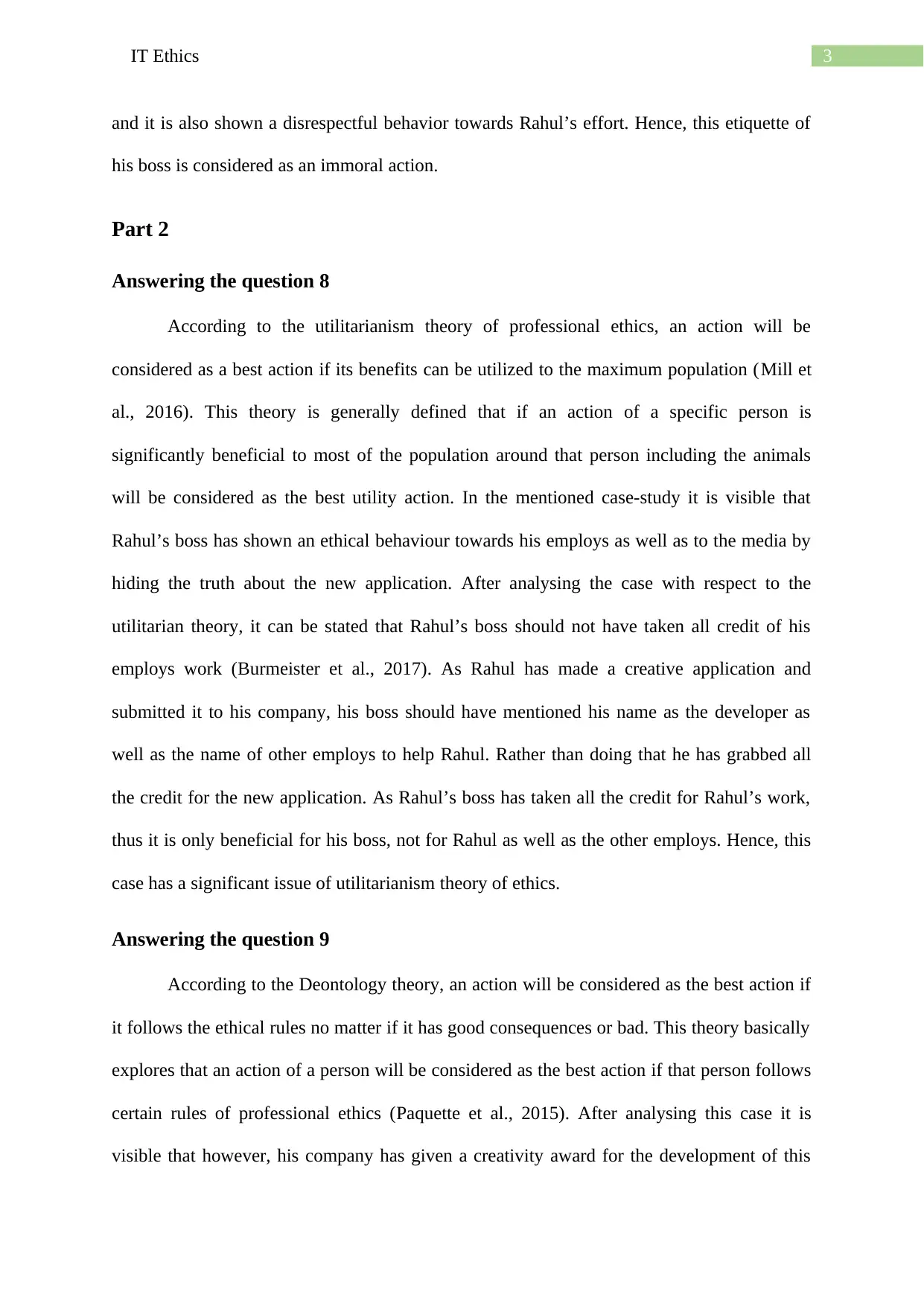
3IT Ethics
and it is also shown a disrespectful behavior towards Rahul’s effort. Hence, this etiquette of
his boss is considered as an immoral action.
Part 2
Answering the question 8
According to the utilitarianism theory of professional ethics, an action will be
considered as a best action if its benefits can be utilized to the maximum population (Mill et
al., 2016). This theory is generally defined that if an action of a specific person is
significantly beneficial to most of the population around that person including the animals
will be considered as the best utility action. In the mentioned case-study it is visible that
Rahul’s boss has shown an ethical behaviour towards his employs as well as to the media by
hiding the truth about the new application. After analysing the case with respect to the
utilitarian theory, it can be stated that Rahul’s boss should not have taken all credit of his
employs work (Burmeister et al., 2017). As Rahul has made a creative application and
submitted it to his company, his boss should have mentioned his name as the developer as
well as the name of other employs to help Rahul. Rather than doing that he has grabbed all
the credit for the new application. As Rahul’s boss has taken all the credit for Rahul’s work,
thus it is only beneficial for his boss, not for Rahul as well as the other employs. Hence, this
case has a significant issue of utilitarianism theory of ethics.
Answering the question 9
According to the Deontology theory, an action will be considered as the best action if
it follows the ethical rules no matter if it has good consequences or bad. This theory basically
explores that an action of a person will be considered as the best action if that person follows
certain rules of professional ethics (Paquette et al., 2015). After analysing this case it is
visible that however, his company has given a creativity award for the development of this
and it is also shown a disrespectful behavior towards Rahul’s effort. Hence, this etiquette of
his boss is considered as an immoral action.
Part 2
Answering the question 8
According to the utilitarianism theory of professional ethics, an action will be
considered as a best action if its benefits can be utilized to the maximum population (Mill et
al., 2016). This theory is generally defined that if an action of a specific person is
significantly beneficial to most of the population around that person including the animals
will be considered as the best utility action. In the mentioned case-study it is visible that
Rahul’s boss has shown an ethical behaviour towards his employs as well as to the media by
hiding the truth about the new application. After analysing the case with respect to the
utilitarian theory, it can be stated that Rahul’s boss should not have taken all credit of his
employs work (Burmeister et al., 2017). As Rahul has made a creative application and
submitted it to his company, his boss should have mentioned his name as the developer as
well as the name of other employs to help Rahul. Rather than doing that he has grabbed all
the credit for the new application. As Rahul’s boss has taken all the credit for Rahul’s work,
thus it is only beneficial for his boss, not for Rahul as well as the other employs. Hence, this
case has a significant issue of utilitarianism theory of ethics.
Answering the question 9
According to the Deontology theory, an action will be considered as the best action if
it follows the ethical rules no matter if it has good consequences or bad. This theory basically
explores that an action of a person will be considered as the best action if that person follows
certain rules of professional ethics (Paquette et al., 2015). After analysing this case it is
visible that however, his company has given a creativity award for the development of this
Paraphrase This Document
Need a fresh take? Get an instant paraphrase of this document with our AI Paraphraser
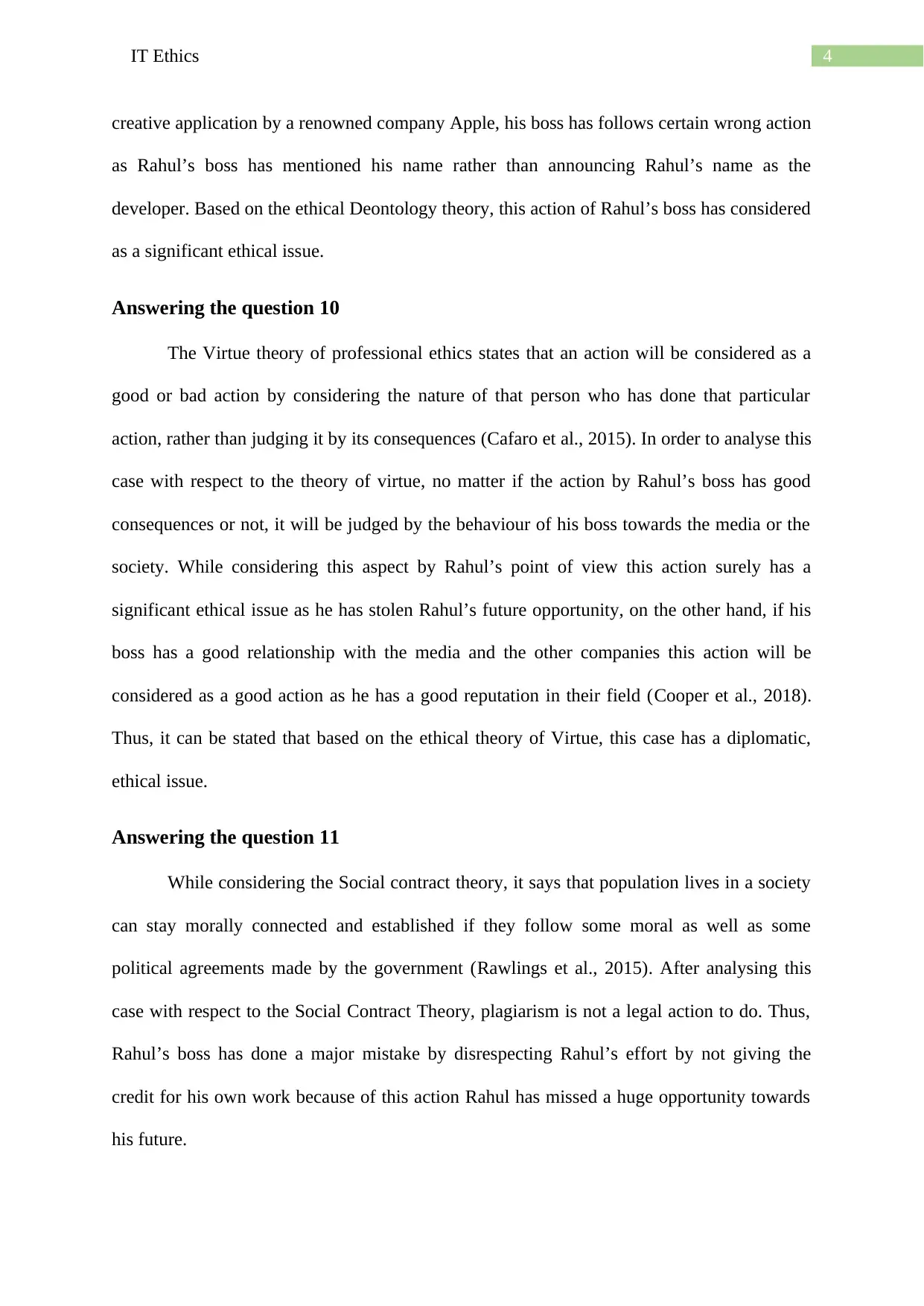
4IT Ethics
creative application by a renowned company Apple, his boss has follows certain wrong action
as Rahul’s boss has mentioned his name rather than announcing Rahul’s name as the
developer. Based on the ethical Deontology theory, this action of Rahul’s boss has considered
as a significant ethical issue.
Answering the question 10
The Virtue theory of professional ethics states that an action will be considered as a
good or bad action by considering the nature of that person who has done that particular
action, rather than judging it by its consequences (Cafaro et al., 2015). In order to analyse this
case with respect to the theory of virtue, no matter if the action by Rahul’s boss has good
consequences or not, it will be judged by the behaviour of his boss towards the media or the
society. While considering this aspect by Rahul’s point of view this action surely has a
significant ethical issue as he has stolen Rahul’s future opportunity, on the other hand, if his
boss has a good relationship with the media and the other companies this action will be
considered as a good action as he has a good reputation in their field (Cooper et al., 2018).
Thus, it can be stated that based on the ethical theory of Virtue, this case has a diplomatic,
ethical issue.
Answering the question 11
While considering the Social contract theory, it says that population lives in a society
can stay morally connected and established if they follow some moral as well as some
political agreements made by the government (Rawlings et al., 2015). After analysing this
case with respect to the Social Contract Theory, plagiarism is not a legal action to do. Thus,
Rahul’s boss has done a major mistake by disrespecting Rahul’s effort by not giving the
credit for his own work because of this action Rahul has missed a huge opportunity towards
his future.
creative application by a renowned company Apple, his boss has follows certain wrong action
as Rahul’s boss has mentioned his name rather than announcing Rahul’s name as the
developer. Based on the ethical Deontology theory, this action of Rahul’s boss has considered
as a significant ethical issue.
Answering the question 10
The Virtue theory of professional ethics states that an action will be considered as a
good or bad action by considering the nature of that person who has done that particular
action, rather than judging it by its consequences (Cafaro et al., 2015). In order to analyse this
case with respect to the theory of virtue, no matter if the action by Rahul’s boss has good
consequences or not, it will be judged by the behaviour of his boss towards the media or the
society. While considering this aspect by Rahul’s point of view this action surely has a
significant ethical issue as he has stolen Rahul’s future opportunity, on the other hand, if his
boss has a good relationship with the media and the other companies this action will be
considered as a good action as he has a good reputation in their field (Cooper et al., 2018).
Thus, it can be stated that based on the ethical theory of Virtue, this case has a diplomatic,
ethical issue.
Answering the question 11
While considering the Social contract theory, it says that population lives in a society
can stay morally connected and established if they follow some moral as well as some
political agreements made by the government (Rawlings et al., 2015). After analysing this
case with respect to the Social Contract Theory, plagiarism is not a legal action to do. Thus,
Rahul’s boss has done a major mistake by disrespecting Rahul’s effort by not giving the
credit for his own work because of this action Rahul has missed a huge opportunity towards
his future.
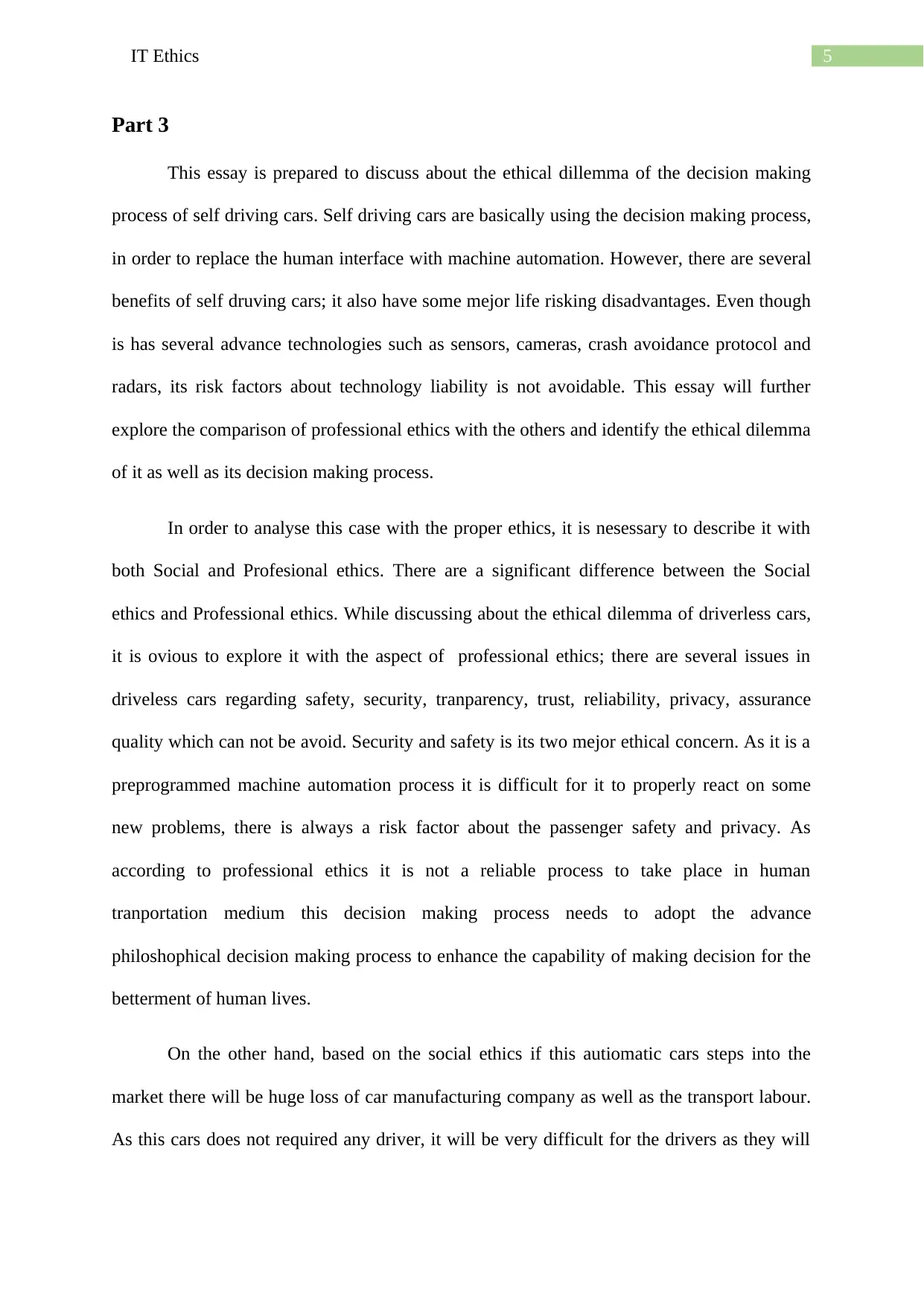
5IT Ethics
Part 3
This essay is prepared to discuss about the ethical dillemma of the decision making
process of self driving cars. Self driving cars are basically using the decision making process,
in order to replace the human interface with machine automation. However, there are several
benefits of self druving cars; it also have some mejor life risking disadvantages. Even though
is has several advance technologies such as sensors, cameras, crash avoidance protocol and
radars, its risk factors about technology liability is not avoidable. This essay will further
explore the comparison of professional ethics with the others and identify the ethical dilemma
of it as well as its decision making process.
In order to analyse this case with the proper ethics, it is nesessary to describe it with
both Social and Profesional ethics. There are a significant difference between the Social
ethics and Professional ethics. While discussing about the ethical dilemma of driverless cars,
it is ovious to explore it with the aspect of professional ethics; there are several issues in
driveless cars regarding safety, security, tranparency, trust, reliability, privacy, assurance
quality which can not be avoid. Security and safety is its two mejor ethical concern. As it is a
preprogrammed machine automation process it is difficult for it to properly react on some
new problems, there is always a risk factor about the passenger safety and privacy. As
according to professional ethics it is not a reliable process to take place in human
tranportation medium this decision making process needs to adopt the advance
philoshophical decision making process to enhance the capability of making decision for the
betterment of human lives.
On the other hand, based on the social ethics if this autiomatic cars steps into the
market there will be huge loss of car manufacturing company as well as the transport labour.
As this cars does not required any driver, it will be very difficult for the drivers as they will
Part 3
This essay is prepared to discuss about the ethical dillemma of the decision making
process of self driving cars. Self driving cars are basically using the decision making process,
in order to replace the human interface with machine automation. However, there are several
benefits of self druving cars; it also have some mejor life risking disadvantages. Even though
is has several advance technologies such as sensors, cameras, crash avoidance protocol and
radars, its risk factors about technology liability is not avoidable. This essay will further
explore the comparison of professional ethics with the others and identify the ethical dilemma
of it as well as its decision making process.
In order to analyse this case with the proper ethics, it is nesessary to describe it with
both Social and Profesional ethics. There are a significant difference between the Social
ethics and Professional ethics. While discussing about the ethical dilemma of driverless cars,
it is ovious to explore it with the aspect of professional ethics; there are several issues in
driveless cars regarding safety, security, tranparency, trust, reliability, privacy, assurance
quality which can not be avoid. Security and safety is its two mejor ethical concern. As it is a
preprogrammed machine automation process it is difficult for it to properly react on some
new problems, there is always a risk factor about the passenger safety and privacy. As
according to professional ethics it is not a reliable process to take place in human
tranportation medium this decision making process needs to adopt the advance
philoshophical decision making process to enhance the capability of making decision for the
betterment of human lives.
On the other hand, based on the social ethics if this autiomatic cars steps into the
market there will be huge loss of car manufacturing company as well as the transport labour.
As this cars does not required any driver, it will be very difficult for the drivers as they will
⊘ This is a preview!⊘
Do you want full access?
Subscribe today to unlock all pages.

Trusted by 1+ million students worldwide
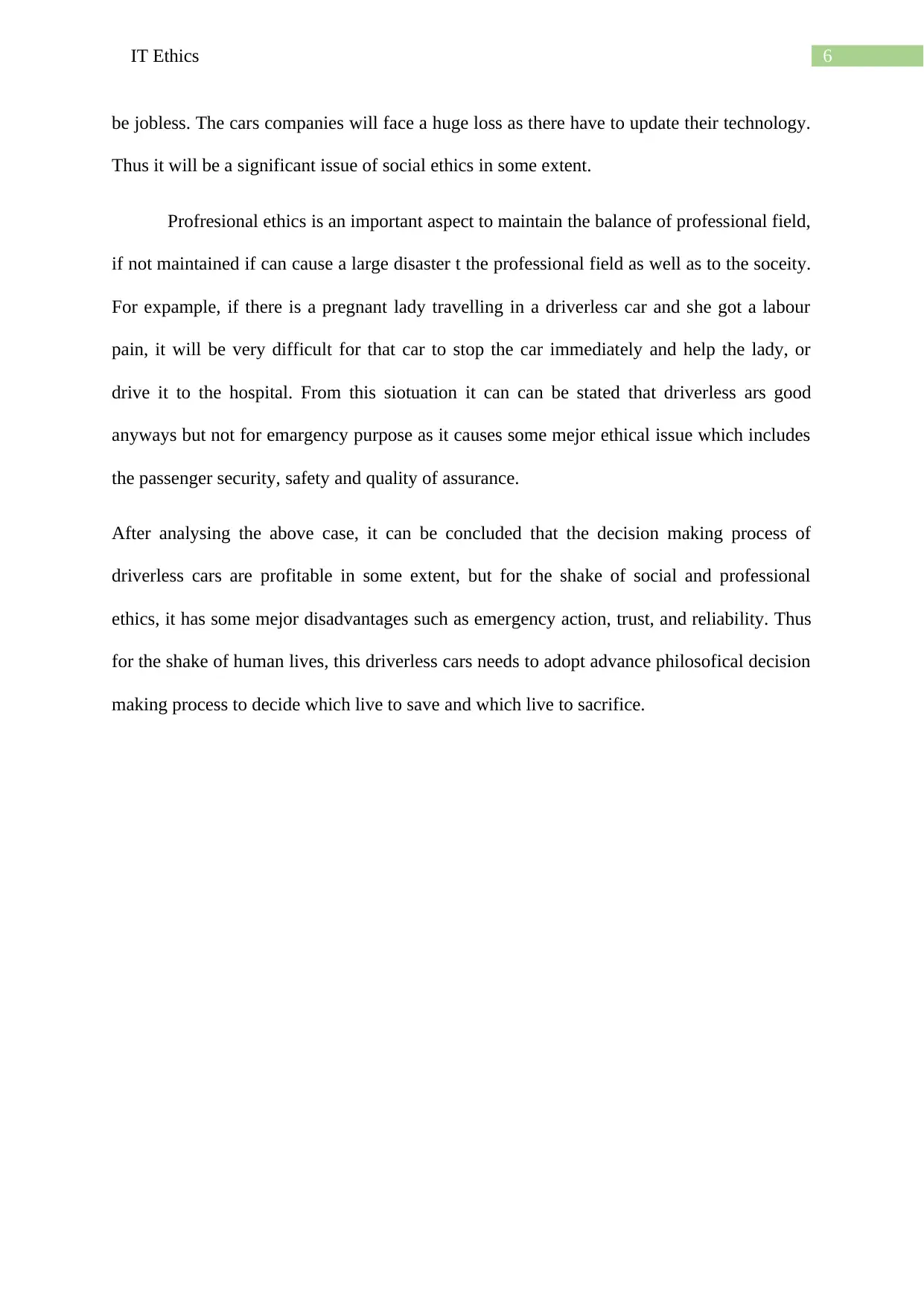
6IT Ethics
be jobless. The cars companies will face a huge loss as there have to update their technology.
Thus it will be a significant issue of social ethics in some extent.
Profresional ethics is an important aspect to maintain the balance of professional field,
if not maintained if can cause a large disaster t the professional field as well as to the soceity.
For expample, if there is a pregnant lady travelling in a driverless car and she got a labour
pain, it will be very difficult for that car to stop the car immediately and help the lady, or
drive it to the hospital. From this siotuation it can can be stated that driverless ars good
anyways but not for emargency purpose as it causes some mejor ethical issue which includes
the passenger security, safety and quality of assurance.
After analysing the above case, it can be concluded that the decision making process of
driverless cars are profitable in some extent, but for the shake of social and professional
ethics, it has some mejor disadvantages such as emergency action, trust, and reliability. Thus
for the shake of human lives, this driverless cars needs to adopt advance philosofical decision
making process to decide which live to save and which live to sacrifice.
be jobless. The cars companies will face a huge loss as there have to update their technology.
Thus it will be a significant issue of social ethics in some extent.
Profresional ethics is an important aspect to maintain the balance of professional field,
if not maintained if can cause a large disaster t the professional field as well as to the soceity.
For expample, if there is a pregnant lady travelling in a driverless car and she got a labour
pain, it will be very difficult for that car to stop the car immediately and help the lady, or
drive it to the hospital. From this siotuation it can can be stated that driverless ars good
anyways but not for emargency purpose as it causes some mejor ethical issue which includes
the passenger security, safety and quality of assurance.
After analysing the above case, it can be concluded that the decision making process of
driverless cars are profitable in some extent, but for the shake of social and professional
ethics, it has some mejor disadvantages such as emergency action, trust, and reliability. Thus
for the shake of human lives, this driverless cars needs to adopt advance philosofical decision
making process to decide which live to save and which live to sacrifice.
Paraphrase This Document
Need a fresh take? Get an instant paraphrase of this document with our AI Paraphraser
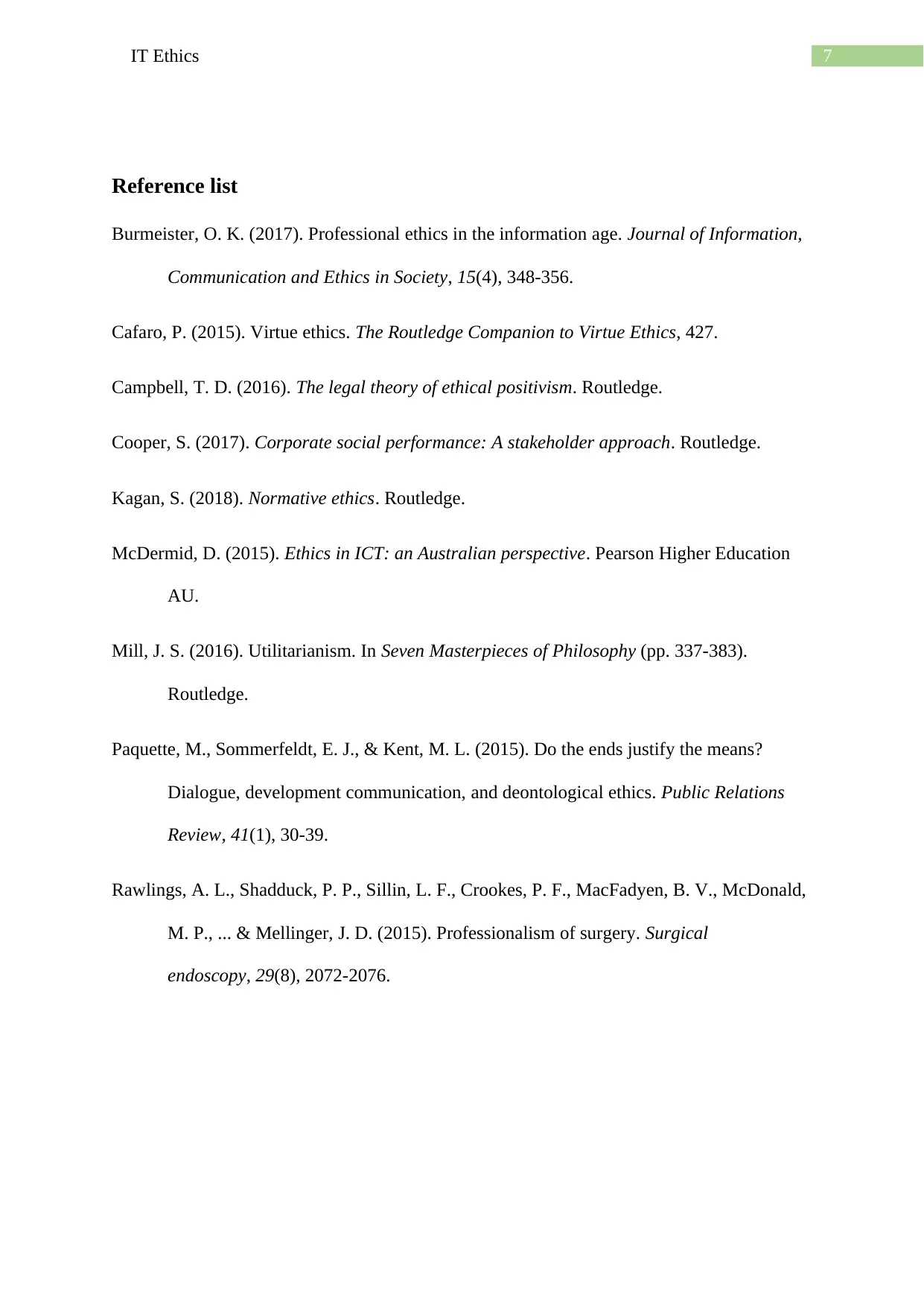
7IT Ethics
Reference list
Burmeister, O. K. (2017). Professional ethics in the information age. Journal of Information,
Communication and Ethics in Society, 15(4), 348-356.
Cafaro, P. (2015). Virtue ethics. The Routledge Companion to Virtue Ethics, 427.
Campbell, T. D. (2016). The legal theory of ethical positivism. Routledge.
Cooper, S. (2017). Corporate social performance: A stakeholder approach. Routledge.
Kagan, S. (2018). Normative ethics. Routledge.
McDermid, D. (2015). Ethics in ICT: an Australian perspective. Pearson Higher Education
AU.
Mill, J. S. (2016). Utilitarianism. In Seven Masterpieces of Philosophy (pp. 337-383).
Routledge.
Paquette, M., Sommerfeldt, E. J., & Kent, M. L. (2015). Do the ends justify the means?
Dialogue, development communication, and deontological ethics. Public Relations
Review, 41(1), 30-39.
Rawlings, A. L., Shadduck, P. P., Sillin, L. F., Crookes, P. F., MacFadyen, B. V., McDonald,
M. P., ... & Mellinger, J. D. (2015). Professionalism of surgery. Surgical
endoscopy, 29(8), 2072-2076.
Reference list
Burmeister, O. K. (2017). Professional ethics in the information age. Journal of Information,
Communication and Ethics in Society, 15(4), 348-356.
Cafaro, P. (2015). Virtue ethics. The Routledge Companion to Virtue Ethics, 427.
Campbell, T. D. (2016). The legal theory of ethical positivism. Routledge.
Cooper, S. (2017). Corporate social performance: A stakeholder approach. Routledge.
Kagan, S. (2018). Normative ethics. Routledge.
McDermid, D. (2015). Ethics in ICT: an Australian perspective. Pearson Higher Education
AU.
Mill, J. S. (2016). Utilitarianism. In Seven Masterpieces of Philosophy (pp. 337-383).
Routledge.
Paquette, M., Sommerfeldt, E. J., & Kent, M. L. (2015). Do the ends justify the means?
Dialogue, development communication, and deontological ethics. Public Relations
Review, 41(1), 30-39.
Rawlings, A. L., Shadduck, P. P., Sillin, L. F., Crookes, P. F., MacFadyen, B. V., McDonald,
M. P., ... & Mellinger, J. D. (2015). Professionalism of surgery. Surgical
endoscopy, 29(8), 2072-2076.

8IT Ethics
⊘ This is a preview!⊘
Do you want full access?
Subscribe today to unlock all pages.

Trusted by 1+ million students worldwide
1 out of 9
Related Documents
Your All-in-One AI-Powered Toolkit for Academic Success.
+13062052269
info@desklib.com
Available 24*7 on WhatsApp / Email
![[object Object]](/_next/static/media/star-bottom.7253800d.svg)
Unlock your academic potential
Copyright © 2020–2026 A2Z Services. All Rights Reserved. Developed and managed by ZUCOL.



